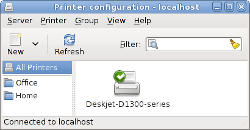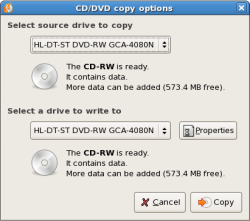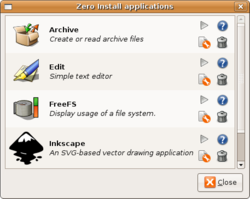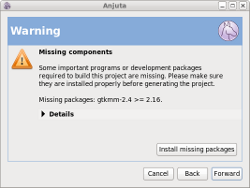
|
Fedora Project - Fedora 9, 10, 11, 12 and 13
Fedora is a Linux-based operating system that showcases the latest in free and open source software.
Fedora is always free for anyone to use, modify, and distribute.
Uses latest PackageKit version.
|

|
Foresight Linux - Foresight GNOME
Foresight is a desktop operating system featuring an intuitive user interface and a showcase of
the latest desktop software, giving users convenient and enjoyable access to
their music, photos, videos, documents, and Internet resources.
Always uses latest PackageKit version.
|

|
Moblin Project - Moblin Linux
Moblin is an open source project focused on building a Linux-based platform
optimized for the next generation of mobile devices including Netbooks,
Mobile Internet Devices, and In-vehicle infotainment systems.
Generally uses latest PackageKit version, but currently 0.4.7 would directly update to next release.
|

|
Kubuntu - Kubuntu
Kubuntu is a free, user-friendly operating system based on the K Desktop Environment
and on the award winning Ubuntu operating system.
With a biannual release cycle and at least 18 months of free security updates
for each release, it is the secure, stable computing environment you've been waiting for.
Default package installer since Kubuntu 9.04 (uses PackageKit 0.3.14)
|

|
openSUSE Project - openSUSE
openSUSE is a free and Linux-based operating system for your PC, Laptop or Server.
You can surf the web, manage your e-mails and photos, do office work,
play videos or music and have a lot of fun!
Uses latest version (0.4.8 in GNOME:Factory)
|

|
SUSE/Novell - SUSE Linux Enterprise Server 11, SUSE Linux Enterprise Desktop 11
SUSE Linux Enterprise 11 is the most interoperable platform for mission-critical
computing—both physical and virtual—from the desktop to the data center.
Uses PackageKit 0.3.14.
|

|
Sabayon Linux
The coolest Gentoo-based Linux distribution aiming to bring the best out-of-the-box
experience, providing a mix of stability and cutting-edge applications.
Uses latest PackageKit version.
|

|
GNOME - Nautilus
The Nautilus file manager provides a simple and integrated way to manage your files and applications.
The file manager lets you organize your files into folders.
Nautilus also manages the desktop. The desktop lies behind all other visible items on your screen.
The desktop is an active component of the way you use your computer.
Uses PackageKit to install missing mime type handlers, to open unknown file formats.
|

|
Fedora Project - system-config-printer
The purpose of system-config-printer is to configure a CUPS server (often the local machine) using the CUPS API.
The tool is written in Python, using pygtk for the graphical parts and with some Python bindings (pycups) for the CUPS API.
Uses PackageKit to install missing printer drivers.
|

|
GNOME - Brasero
Brasero is a application to burn CD/DVD for the Gnome Desktop.
It is designed to be as simple as possible and has some unique features to enable users to create their discs easily and quickly.
Uses PackageKit to install missing gstreamer and burning backends (cdrdao,cdrtools,cdrkit and libburnia)
|

|
Zero Install
Zero Install is a distributed, cross-distribution installation system in which packages are identified by globally unique URIs.
Uses PackageKit to install missing dependencies, using the distribution's native package manager through 0launch (version 0.49 or higher)
|

|
Anjuta
Anjuta is an integrated development environment for GNOME supported
various programming languages such as C/C++, Python, Vala and
Javascript.
PackageKit is used to install missing packages when creating a new
project.
|



